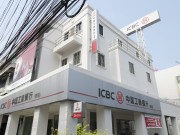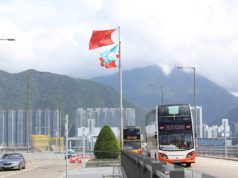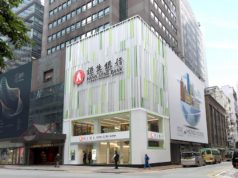Keynote Speech by Chairman Yi Huiman at the CSRC Roundtable of China Development Forum 2021
26th May 2021 | Hong Kong
This is a keynote speech by Chairman Yi Huiman at the CSRC Roundtable of China Development Forum 2021, with the speech providing key insights into capital market developments, guiding principles of the system, growth, risks, challenges, new policies and plans. (The speech was given on 20th March 2021 at the CSRC Roundtable of China Development Forum 2021)
 Mr. Yi Huiman is the Chairman of China Securities Regulatory Commission (CSRC) and Secretary of the CPC CSRC Committee.
Mr. Yi Huiman is the Chairman of China Securities Regulatory Commission (CSRC) and Secretary of the CPC CSRC Committee.
China Securities Regulatory Commission (CSRC), a ministerial-level public institution directly under the State Council, performs a unified regulatory function, according to the relevant laws and regulations, and with the authority by the State Council, over the securities and futures market of China, maintains an orderly securities and futures market order, and ensure a legal operation of the capital market.
Distinguished guests, ladies and gentlemen,
Good evening! It gives me great pleasure to attend the 2021 annual meeting of the China Development Forum. The year 2021 marks the beginning of the 14th Five-Year Plan and a new journey to build China into a modern socialist country in all respects.
In China’s pursuit of high-quality development, the new development stage, new development philosophy, and new development pattern have become the theme of our mission and received worldwide attention.
The CSRC is bestowed with the important task of enabling the capital market, which is a key component of modern economic system, to better serve high-quality economic development. Taking today’s opportunity, I would like to share with you some of my thoughts and observations on China’s capital market.
I. Mission of the capital market in serving high-quality development.
The fifth plenary session of the 19th Central Committee of the Communist Party of China and the Central Economic Work Conference enunciated instructions to fully implement a registration-based IPO system, establish a normalized delisting regimes, increase the proportion of direct financing, and maintain a robust and sound capital market.
The 14th Five-Year Plan approved by the fourth session of the 13th National People’s Congress, outlined several key tasks including advancing registration-based IPO reform, improving the quality of listed companies, expanding the participation of institutional investors, deepening the opening-up of capital market, etc. These specific requirements and priorities, which touch upon a wide range of work, have shown that the CPC Central Committee and the State Council attaches great importance and high expectations to the capital market.
After three decades of development, China’s capital market has made substantial progress in market scale, system and structure, quality of development, and opening-up. At the new starting point of a new stage, our key mission is to ground our efforts in improving the capital market and enable it to better serve China’s high-quality economic development while remaining steady and sound.
We understand that the mission of capital market in the new development stage stands on two pillars.
First, better resource allocation function. With investment and financing activities, M&A and reorganization, and other market mechanisms through equity and debt vehicles, we will give full play to the decisive role of the market in resources allocation, capital formation, and clustering of production factors in the most promising industries, so as to improve the quality of production factors and the efficiency of allocation.
Second, efficient incentive and constraint mechanism. In addition to capital support, technological innovation leans more on individual passion and creativity. Sharing of risks and benefits, a unique feature of capital market, is an effective solution and an accelerator to capital formation, conducive to circulation of technology, capital, and production, and the upgrading of the industrial base and the modernization of the industrial chain.
II. Promoting structural improvement of capital market through comprehensively deepening reform.
Centering on the overall goal of building a capital market that is well-regulated, transparent, open, vigorous, and resilient, and under the overall arrangements made by the Financial Stability and Development Committee, we have implemented a new round of comprehensively deepening reform of capital market.
The reform efforts have effectively improved and stabilized market expectations and brought about profound structural changes in the capital market. Looking back on our work in the past two years, we have upheld the spirit of “system building, no interference, and zero tolerance”, which is embodied in four keywords.
Institutions. Robust institutions provide for fundamental strength and long-term outcomes. As capital market is strongly market-oriented by nature and must be established upon sound rules and regulations, the steady and sustained development can only be ensured by a system that is transparent, consistent, coherent, and predictable.
In this round of reform, we have been taking fundamental system improvement as the overarching principle. On one hand, to improve the legal system for capital market with two main achievements.
One was the revision of the Securities Law, which provides fundamental basis for the registration-based securities issuance reform, significant increases in the ceiling fines imposed on violations, and enhanced investor protection.
The other one was the introduction of the Amendment XI to the Criminal Law, in which fraudulent issuance, misrepresentations, fake documents falsified by intermediaries, and market manipulation will face much heavier penalties.
On the other hand, we are promoting a series of institutional innovations led by the registration reform, in areas such as secondary offerings, M&A and reorganization, trading and settlement, and shareholding reductions, and introduced new delisting rules to significantly enhance the adaptability and inclusiveness of the system.
We will continue to make progress while ensuring stability with unremitting efforts in building a more well-founded and established system and improving our capacity in the governance of the capital market.
Structure. Restructuring is critical to the transformation from quantitative to qualitative growth. The most salient bottlenecks in the high quality development of the capital market are structural ones, which exist in many aspects such as financing, listed companies, intermediaries, investors, the volume and maturity of funding, etc.
Faced with structural conundrums, we have always followed a systematic and dialectical working philosophy and focused on seeking reformative perspectives and solutions, with the aim to build sustainable structures for sustainable development. Practice has shown that tackling structural issues can resolve essential problems.
Take market leverage for example, I think market fluctuations are natural phenomena as long as there is no excess leverage. The key is a sound funding structure. In the past few years, we have reflected on the lessons learned from previous abnormal fluctuations, and paid equal attention to participants in both exchange-traded and OTC markets, both domestic and overseas markets.
To ensure transparent, see-through, and effective regulation, we have taken a series of measures to keep the scale of leveraged funding at a sound status. At present, leverage risks in the A-share market are generally within control.
Another example is expanding the share of professional investment. Public funds, regulated private funds, and asset management business of securities companies have been growing rapidly in the past two years, with the number of investors purchasing funds rising quickly, which indicates promising trends. However, whether the asset management sector can rise up to this emerging trend and new demands still warrant judicious consideration.
We must try to solve the imbalances, narrow the quality gap between supply and demand, and avoid repeating old mistakes. Given the national conditions in China, key tasks at the current stage are to urge the industry to form a sound cultural environment, increase professional capabilities, improve performance assessment, and optimize business structures.
By doing so, the industry may build up differentiated advantages, gain the trust of investors,achieve meaningful growth for both investors and the industry itself, and contribute to a better investor structure.
Ecosystem. Capital market resembles a complex ecosystem. Only a healthy market environment can derive trust and confidence, and facilitate asset allocation, wealth management, and direct financing.
In my opinion, it is the mission of regulators to build a sound ecological environment and maintain an open, fair, and just market that generates sustained appeal to all types of participants. One important aspect is strengthening the deterrence of a “zero-tolerance” stance and making wrong doers pay heavily for their behaviors.
We have been sparing no efforts in improving the enforcement and judicial frameworks for securities misconducts, and in building a multi-dimensional accountability system of regulatory enforcement, civil reclamation, and criminal punishment.
For example, the ceiling fine for information disclosure related violations has been lifted from RMB 600,000 to RMB 10 million; the maximum sentence for fraudulent issuance has been increased from 5 years to 15 years; and channels for investors to protect their rights have been further expanded with the establishment of a special “opt-out” representative litigation mechanism for securities related disputes.
We are also taking more actions to hold intermediaries accountable by carrying out investigations on both issuers and intermediaries, and imposing financial punishment along with qualification restrictions. The second important aspect is promoting all stakeholders to duly fulfill their roles and responsibilities.
Following the regulatory philosophy of forming synergy with reverence for the market, the rule of law, professionalism, and risks, we are guiding listed companies to operate with honesty and pursue innovation while remaining committed to core business.
We are promoting an industry culture that features compliance, integrity, professionalism, and robustness. We are also advocating rational, long term, and value-based investment. In a nutshell, all parties are contributing to and benefiting from a jointly built development pattern.
Composure. Capital market faces a complex and ever evolving external environment. Market participants have various purposes and goals; markets rise or fall from time to time; and regulators are often tasked with multiple goals and facing difficult choices.
We must have sufficient patience and composure, maintain judicious thinking and independence, and make analysis and decisions from a comprehensive, dialectical, professional, and objective perspective. We must respect and follow the rules of the market, avoid changing policies easily under the influence of external opinions or opting for a seemingly right but intrinsically wrong path.
Regardless of the remarkable difficulty in practicing those philosophies, in the past two years, we have remained committed to the principle of “system building, no interference, and zero tolerance”, focused on delivering concrete results with regard to priorities for the capital market, and kept a determined stance.
First, we have adopted the right regulatory philosophy. We have remained true to the original mission of regulation, fulfilled our statutory mandates, strictly prevented regulatory vacuum, and brought all financial activities under regulation. We strove to be meticulous and strict in regulation, have the courage to confront difficult tasks, and not be disturbed by external noises.
Second, we have been practicing the philosophy of “no interference”. With an aim to balance the roles of the government and the market, and effectively coordinate liberalization and regulation with a determined stance, we remained committed to market-oriented and law-based regulation and refrained from unwarranted administrative interference.
Third, we have been improving regulatory transparency and predictability. We have maintained policy consistency and continuity and will not be swayed by temporary market fluctuations. We took steady steps in the right direction and kept moving forward toward the final destination. We have been promoting “regulation in the sunshine” by ensuring regular public access to information with fewer exceptions, conscientiously subjecting ourselves to public supervision, exercising power with cleaner hands, and eliminating abuse of discretion.
Fourth, we have continued to enhance regulatory capacity. While adhering to scientific, risk-based, professional, and continuous regulation, we strove to find the underlying logic beneath the evolving markets, identify commonality from individuality, and understand universal rules from a dialectical perspective. We have stayed true to our core missions, remained committed to professionalism, designed regulatory targets that emphasize on substance over form, and pursued relentlessly for better regulation.
III. Steadily advancing the registration-based IPO reform.
The registration-based IPO reform is the key reform initiative in this round of comprehensive reforms of China’s capital market. During the reform course, we have been upholding three core principles, namely respect for the essence of a registration-based system, alignment with international best practices, and suitability with the characteristics and development stage of China’s market.
Initiating from the Shanghai STAR Market pilot and further expanding to the Shenzhen ChiNext Market covering both new and existing IPO applications, the IPO reform has made substantial breakthroughs.
The newly established registration system has stood the test of market and is running up to expectations. The two markets are operating with sustained stability and new vitality. While implementing such a new reform, we have been paying close attention to the feedback from market participants with an attitude of listening to the market and learning from the market for continuous improvement.
We’ve also realized that more in-depth discussions and consultation is needed to dispel the myths, strengthen the consensus, form a better understanding of the essence and implications of a registration system, and ensure that the reform progresses with steady steps. Here I would like to take this opportunity and share my thoughts on some doubts of the market.
Do we need to review IPO applications under a registration system?
As public share offerings entail extensive public interest, major markets in the world all have put in place rigorous rules and procedures for the review and registration of IPOs. The US securities regulator has a large professional team to review IPO filings by industries.
The HKEX and Hong Kong SFC adopt a dual filing regime, where both parities review listing applications with different focuses. Applying a registration system is all but relaxing review requirements.
Both Shanghai and Shenzhen stock exchanges are obligated to strictly fulfill their vetting responsibilities for the STAR Market and ChiNext Market before referring the applications to CSRC for registration. The CSRC shall examine the vetting by the exchanges, and exercise supervision over material issues concerning listing eligibility and information disclosure. Practice has approved that these arrangements are both effective and necessary.
Does adequate information disclosure alone qualify an IPO for listing?
A registration system centers around information disclosure and institutes more streamlined and inclusive listing requirements. Matters that can be left to the judgement of investors are reflected in the rigorous, comprehensive, in-depth, and targeted information disclosure requirements instead of being incorporated into listing criteria, which used to be the case under a verification system.
But the compliance with information disclosure formalities alone is not enough for China’s capital market. We have 180 million retail investors, a reality not seen in any other country in the world. This is a unique feature of our markets that must be taken into consideration in any policy-making. It means we have to pay vigorous attention to the quality and adequacy of information disclosure in our review process to ensure its truthfulness, accuracy, and completeness. We believe these are necessary and pragmatic actions for the current stage.
Are the market intermediaries ready for the new system?
Market intermediaries, including sponsors and auditors, are experiencing a major shift in role during the transformation of a verification system to a registration system. In the past, their first and foremost goal is to improve issuers’ worthiness of an approval; whereas now, their goal is to increase the issuers’ worthiness as an investment, which is practically more demanding for their role as market gatekeepers.
During a recent on-site inspection, a large percentage of IPO applicants withdrew their listing applications. Based on the information we have at hand, one of the key common reasons is the incompetence of their sponsors. The current situation shows that many intermediaries have not aligned their mindset, business structure, and capacity with the registration system.
They are walking down the old lane wearing new shoes. We are looking further into this issue and will take targeted measures where necessary. For companies that attempted to force their way to IPO in a sick shape, we will take vigorous actions against any misconducts, and will not allow them to get away with it by simply withdrawing applications.
All in all, we will further strengthen the role of market intermediaries and urge them to better fulfill their respective duties. Meanwhile, it is also necessary for the market regulator to improve the regulatory framework and perfect the fundamental institutions of the market.
How to maintain a balanced development of the primary and secondary markets?
Recently, the queuing of IPO registrations has drawn wide market attention. Some argues that since we are opting for a registration system, there should be no restrictions on the pace of share offerings.
According to our analysis, the current IPO line-up is attributable to multiple factors. It generally reflects both the growing vitality in China’s real economy and the appeal of China’s capital market to issuers, and is quite different from what used to be a backlog of IPO reviews several years ago. Back then, the suspension of IPOs from time to time had caused a lot of uncertainties in market expectation and some issuers had to queue for two to three years. After the registration-based IPO system was effected, the review cycle for an IPO registration has been significantly shortened and brought closely in line with that of overseas mature markets.
To achieve sustainable development of the capital market, full considerations shall be given to maintain a dynamic and positive equilibrium between financing and investment activities. Only when both the primary and secondary markets are operating in an orderly and stable way, can an enabling ecosystem for new share offerings gradually take form.
Currently, we are focusing on improving working methods to provide better services for market participants while stepping up regulation to be more targeted and enhancing accountability of issuers and intermediaries. We aim to set a normalized pace of IPOs that meets market expectations by fully leveraging market-based measures under the rule of law.
The 2021 Government Work Report has set the goal to “steadily advance the reform to establish a registration-based IPO system”. We will continue to make progress while ensuring stability in a systematic manner. We will conduct a full assessment of the registration-based IPO system piloted on the STAR Market and the ChiNext Market, and improve the regulatory framework that brings every link of the registration system under regulatory oversight.
To pave the way for implementing the registration system across the whole market, we will balance the IPO reform with other six key tasks, which are improving the quality of listed companies, strengthening accountability of financial intermediaries, safeguarding market order, defining the role of stock exchanges in stock offering reviews, transforming the role of CSRC in stock offering regulation, and forestalling abuse of power.
The reform to establish a registration-based IPO system is a far-reaching and highly sensitive reform initiative that entails complicated interests and concerns of all stakeholders. Joint efforts and support from all participants is required to establish an even more solid foundation for the steady landing of this major reform.
IV. Orderly promoting institutional opening-up of the capital market.
At the Lujiazui Forum in 2019, the CSRC announced nine measures to further open up China’s capital market. We are delighted to see that the policies were implemented on the point and yielded positive effects. These measures, which aim to build market and product connectivity, remove restrictions on foreign ownership and scope of business in financial service providers, and facilitate cross-border financing and investment, are all in line with the requirements of the pre-establishment national treatment and negative list system.
By the end of 2020, foreign capital had registered net inflow for the third consecutive year and A-share assets held by overseas investors surpassed RMB 3 trillion. This reflects the fact that China’s capital market has a strong appeal to international investors and has generated good returns for their investments, and there remains great potential for further growth.
Recently, however, I have noticed an interesting phenomenon in the market. Certain scholars and analysts have been giving greater weight to external factors than domestic ones in making judgement. For example, they are paying more attention to US treasury yields than LPR, Shibor, and China’s treasury yields, and more to inflation expectations in foreign economies than China’s CPI. I won’t comment on such tendency, but I’d like to encourage you to give it further considerations against the backdrop of China’s new development pattern.
Looking at foreign participation in China’s capital market, their holdings of A-shares and related market share account for less than 5%, not a high percentage compared with that in mature markets.
Moving forward, we will continue to open up the capital market, and hold an open and supportive attitude to foreign participants setting up branches, growing businesses, and offering products in the domestic market. In the meantime, we will also carefully coordinate opening-up with risk prevention, which borders on two aspects at present.
First, to prevent massive cross-border flows of foreign capital. Normal cross-border capital flows are welcomed, but massive inflows and outflows of hot money, which are by nature detrimental to market soundness, are strictly regulated in any market. We shall step up preemptive risk monitoring and analysis, and shore up regulatory regimes to avoid falling into a passive position.
Second, to properly resolve risks related to Chinese companies listed overseas. We have been trying to engage our counterparts in the US to effectively cooperate on this issue and proposed multiple solutions, but still have not received full and positive feedback. It is in our firm belief that cooperation brings win-win results, and that only by sitting down and consulting each other can problems be solved and differences resolved.
Distinguished guests and friends, I’d like to thank you again for your continued support to China’s capital market. We look forward to your broader and deeper participation in China’s market.
View: Full Keynote Speech

Mr. Yi Huiman, Chairman of China Securities Regulatory Commission (CSRC)
Mr. Yi Huiman is the Chairman of China Securities Regulatory Commission (CSRC) and Secretary of the CPC CSRC Committee. Mr. Yi was appointed as Chairman of the CSRC and Secretary of the CPC CSRC Committee since 26 January 2019.
Mr. Yi started his career in the Hangzhou Branch of the People’s Bank of China in August 1984. He joined the Industrial and Commercial Bank of China (ICBC) in January 1985 and had held various positions in the bank’s branches and headquarters. Since July 1998, Mr. Yi had worked as Deputy Head and CPC Secretary of Zhejiang Branch, Head and CPC Secretary of Jiangsu Branch, and Head and CPC Secretary of Beijing Branch, ICBC.Since May 2005, Mr. Yi started to serve the ICBC Headquarters as a member of CPC ICBC Committee while continued heading the ICBC Beijing Branch. He was appointed as Vice President of ICBC in 2008 before he became ICBC’s Vice Chairman of Board, President and Deputy CPC Secretary in 2013. Mr. Yi assumed the office as the Chairman of Board, ICBC and Secretary of CPC ICBC Committee in May 2016.
Mr. Yi Huiman, born in December 1964, is an ethnic Han from Cangnan, Zhejiang Province. He holds a Master’s degree in Executive Business Administration.
China Securities Regulatory Commission (CSRC)
China Securities Regulatory Commission (CSRC), a ministerial-level public institution directly under the State Council, performs a unified regulatory function, according to the relevant laws and regulations, and with the authority by the State Council, over the securities and futures market of China, maintains an orderly securities and futures market order, and ensure a legal operation of the capital market.
Sign Up / Register
Caproasia Users
- Manage $20 million to $3 billion of assets
- Invest $3 million to $300 million
- Advise institutions, billionaires, UHNWs & HNWs
Caproasia Platforms | 11,000 Investors & Advisors
- Caproasia.com
- Caproasia Access
- Caproasia Events
- The Financial Centre | Find Services
- Membership
- Family Office Circle
- Professional Investor Circle
- Investor Relations Network
Monthly Roundtable & Networking
Family Office Programs
The 2025 Investment Day
- March - Hong Kong
- March - Singapore
- July - Hong Kong
- July - Singapore
- Sept- Hong Kong
- Sept - Singapore
- Oct- Hong Kong
- Nov - Singapore
- Visit: The Investment Day | Register: Click here
Caproasia Summits
- The Institutional Investor Summit
- The Investment / Alternatives Summit
- The Private Wealth Summit
- The Family Office Summit
- The CEO & Entrepreneur Summit
- The Capital Markets Summit
- The ESG / Sustainable Investment Summit









































